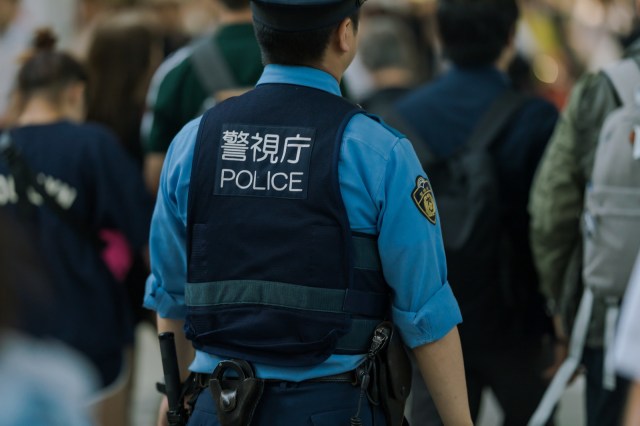
Shibuya protest comes eight days after a foreigner was filmed being detained by police on the road in Tokyo.
As people around the U.S. come out in protest against the death of George Floyd on 25 May by a police officer in Minneapolis, here in Japan tensions are rising following an incident many are condemning as racial profiling by police.
The incident, which occurred at around 1 p.m. on 22 May on Meiji Doori in Hiroo, in Tokyo’s Shibuya Ward, was captured on video and has since been shared widely online. The short clip shows two police officers holding a man down in front of a police vehicle on the busy road while another stands beside the vehicle that was stopped, with a passenger still inside.
In the video, the man, who was later revealed to be Kurdish, can be heard saying repeatedly in Japanese, “I didn’t do anything” and “run, run!” before asking the person filming to help him. The police officers repeatedly tell him to “stop” while keeping a firm grip on him.
This video shows the older police officer forcing the Kurdish man to his knees. Japanese police officers are trained to use “taiho-jutsu” (“arresting techniques”), which employs judo moves in order to restrain individuals without the use of guns, tasers, or pepper spray.
In Japan, when a car is stopped by police on the road, speakers are used to instruct the driver to pull over and once the car has stopped, a police officer will approach the vehicle on the driver’s side and explain the reason why they were pulled over. If a road violation has occurred, the driver will usually be asked to leave their vehicle to sit inside the police car while the paperwork is completed and handed to them. Fingerprints are also taken inside the car during this time, even for minor traffic violations, like failing to stop at a stop sign.
As drivers are required to drive on the left in Japan, it remains unclear as to why this particular vehicle came to a stop in the far right lane, and why the doors of the car were open and the man was being restrained on the road.
Freelance journalist Hideki Kashida says the Kurdish man was released by police a short while after the video was filmed, and that the man was restrained after he greeted the police with “gokurosama desu”, which translates to “thanks for your work”, although it’s a phrase usually only used when speaking to a subordinate.
Kashida’s tweet above reads:
“Actually, tens of minutes later he was released so he really didn’t do anything. He only said “gokurosama desu” to an officer he made eye contact with. It appears that a citizens’ group will be meeting at the front of the Hachiko statue at 3:00 p.m. on 30 May and heading to Shibuya Police Station for a protest demonstration. Banners and placards are welcome. The person who was injured (by police in the video) might attend.”
While what actually happened in the lead-up to the events seen in the video remains unverified, the incident highlighted the larger issue of racial profiling in Japan. Spurred on by the protests against police currently taking place in the U.S., a group of approximately 200 people joined the protest in Tokyo, walking through the Shibuya scramble crossing on their way to the police station with placards that read “f*ck the police” and “punish racist cops” in English and Japanese.
Protestors drew comparisons between what happened in Tokyo and police brutality in the U.S.
Japanese politician Taiga Ishikawa spoke to protesters on the day to show support. He later took to Twitter to condemn the “violent actions” of police against the Turkish man, saying one of the officers involved in the incident seized the phone when he realised they were being filmed and erased the footage. The video was able to be retrieved as it was backed up in the cloud.
Using the hashtag #0530渋谷署抗議 (0530 Shibuya Station Protest), protestors shared photos and videos of what occurred during the demonstration.
According to this Twitter user, a male protestor was arrested after breaking through the police line and entering the police building at 5:03 p.m.
▼ This video shows the clash that occurred between protestors and police.
In Japan, it’s not uncommon for people with non-Japanese features to be stopped by police on the street and asked to show identification. This practice largely affects non-white foreigners in Japan, with police reasoning pointing to the fact that a number of low-skilled workers — brought over from other parts of Asia as part of a government initiative to alleviate severe labor shortages — have overstayed their visas.
▼ Even the New Zealand-born captain of the Japan national rugby team has been asked to show his I.D. to police.
This targeting of individuals based on their appearance has long been an aspect of life in Japan that continually sparks concern and anger amongst the foreign community. This weekend’s protest, spurred on by events in the U.S., shows that more individuals, including Japanese, are losing their patience with racial profiling and are now prepared to take more of a stand against improper treatment of foreigners by police.
Source: Twitter/#0530渋谷署抗議
Featured image: Pakutaso
● Want to hear about SoraNews24’s latest articles as soon as they’re published? Follow us on Facebook and Twitter!